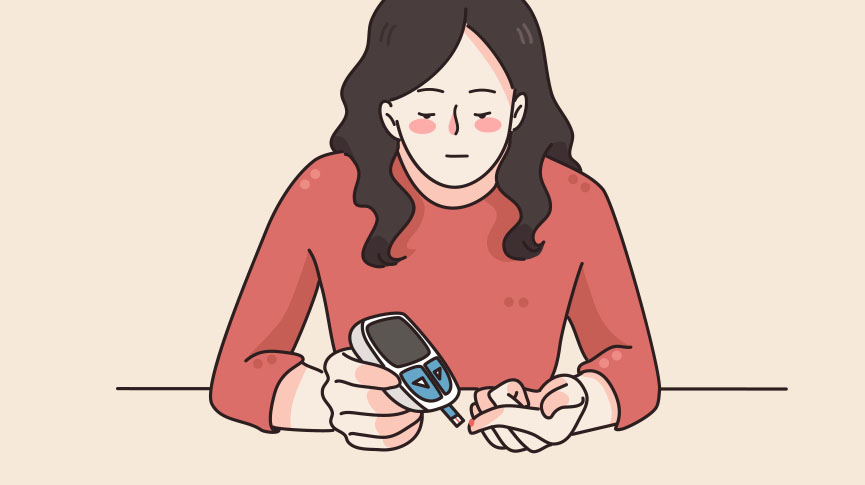Balancing Your Blood Sugar: Eating for Fatigue

Do you often feel tired throughout the day? Experience brain fog, unstable moods, or difficulty concentrating? Does hanger get the best of you sometimes? Cue the age-old saying “You are what you eat”. While there’s a lot more to it than that, the food you consume is one of the biggest factors when it comes to how you feel.
You’ve heard the term blood sugar thrown around left and right, oftentimes in the context of diabetes. It’s important to be aware of whether or not you have diabetes or are prediabetic, but that’s not all there is to it. So what do food and blood sugar have to do with fatigue? Just about everything! So let’s get the low down on balancing your blood sugar and eating for fatigue.
What is Your Blood Sugar?
Sugar tends to have a bad reputation, but it’s an essential building block of life. Your blood sugar, also known as glucose, is the main source of energy for your body. Glucose is brought to every cell in your body for energy via your bloodstream. This delicate balance can easily be thrown off by being too low or too high, whether or not you have diabetes. Knowing how to eat to maintain your blood sugar is one of the best ways you can help prevent fatigue and increase energy levels. Let’s learn how.
What Foods Help to Balance Blood Sugar?
When it comes to balancing blood sugar, it’s important to have a foundation of what nutrients your body needs to thrive. It doesn’t have to be complicated and you don’t need to run out and buy every health food trend out there. What your body mainly needs are good quality veggies, proteins, fibers, as well as some sugars and starches. These are some great foods to turn to to help maintain your energy levels:
- Fish and seafood
- Yogurt and good quality dairy products
- Cruciferous vegetables like broccoli and cauliflower
- Different kinds of potatoes
- Meat and veggie based sources of protein like legumes
- Eggs
Are there foods that can disrupt your blood sugar? Yes, and those tend to be complex carbs like bread and pasta, as well as processed, sugary snacks and treats. But don’t worry, you can absolutely still eat them! Unless you’re actually allergic to something or have an intolerance, you don’t need to totally avoid foods that can tweak your blood sugar. Life is about balance as well as pleasure. It’s important to enjoy your favorite foods from time to time without guilt, and it’s even better to do it with loved ones!
More Blood Sugar Balancing Tips
It’s not just about what you eat that’s important for reducing fatigue, but also how you eat it. Keep these tips in mind as you go about your days, and you’ll be sure to notice a difference!
- For the most stable blood sugar, try to eat veggie first, protein second, then starches and sugars pasta, bread, or fruit last.
- Move your muscles for ten to fifteen minutes after eating whether that’s by going through a walk, cleaning up your home, or dancing to your favorite song. This helps glucose be absorbed by muscular cells to make energy as it arrives in the bloodstream.
- If you’re going to eat sugar, try to do it on a full stomach to slow the absorption of glucose and fructose so that you have a smaller glucose spike. Sugar tricks us into thinking we have energy by giving us a dopamine rush, but it can actually make us crash when eaten on its own.
- Drinking vinegar before a meal, this could be a tablespoon of apple cider vinegar in water or even a few tablespoons of pickle juice!
- Eat a savory breakfast instead of a sweet one to start yourself off on the right foot.
- Eat your starches with protein, fat, or fiber, like putting yogurt coconut cream in your oatmeal.
- Your blood sugar needs will change depending on where you’re at in your cycle, or if you’re pregnant or menopausal. They can also change depending on your activity level, stress in your life, as well as the seasons. Let your diet fluctuate with your body’s needs.
Addressing Underlying Health Conditions
Finding a diet that works for you is incredibly important when it comes to treating symptoms like fatigue and brain fog, but it’s not always that simple for everyone. It’s important to address the fact that many people have undiagnosed health conditions that may be contributing to your symptoms.
Other possible conditions for vague symptoms like fatigue and brain fog include thyroid disorders, Lyme disease, and chronic fatigue syndrome. If you’re experiencing fatigue and other symptoms that are interfering with your daily life, it’s important to see a medical provider and ask for things like hormonal testing, and other diagnostic tools.

A collective group of “lady experts” at Intimina who love sharing our personal experiences, even when they are a little too personal. We believe it’s time to start breaking down the taboos around menstruation, motherhood, and menopause, and start owning our female health.


